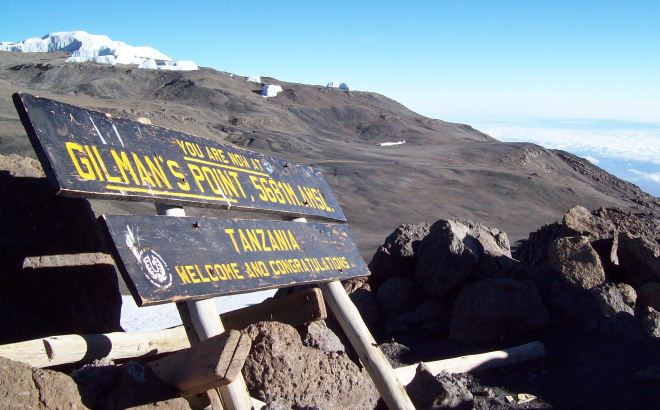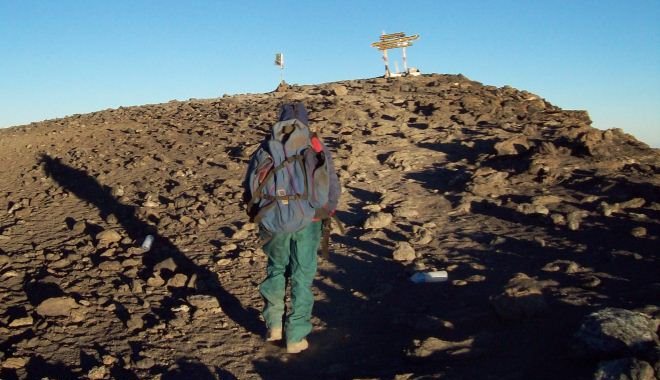
It’s 11:30pm, we’re at an altitude of 4,500 meters, it’s cold, it’s dark and we are about to start our ascent. Only 8 hours of climbing in sub-zero temperatures and gale force winds are stopping us from achieving our goal.
Upon reflection of our journey in 2008, we realized that during that week we discovered a life lesson that you could to anything in life.
In 2007, a good friend and I discussed the possibility of climbing Mt Kilimanjaro the following year. We researched, planned and trained as best as possible to set ourselves for the challenge.
We knew it was going to be hard, but we were not prepared for how hard it actually was going to be.
The mental and physical challenge starts at the hotel. There you get to meet the people who have battled the mountain the week before. Some with exuberance to share their achievement and some who were defeated.
We enjoyed listening to the stories from the mountain but for us our focus was on those who didn’t make it and why.
The excuses came … I didn’t get enough sleep, I wasn’t prepared, I couldn’t handle the cold etc.
There was one guy in particular who we still talk about. Like us, he had saved, trained and carefully planned his expedition. He got to a checkpoint on summit day called “Gilman’s point” where his guides decided that he had to return due to extreme altitude sickness. He was only 2 hours from the summit.

The story broke our hearts. It wasn’t necessarily the embarrassment but that he had planned for so long to be so close and to fall just short – it was depressing and scary.
Was this going to happen to us?
With this question in mind, we set off on our journey the following morning in nervous anticipation. The thought of falling short was already causing sickness and we were still at sea level. Did we have what it takes to make it to the top?
For 5 days we put one foot in front of the other as we snaked our way up the mountain. We experienced a bout of altitude sickness and had to deal with ever present shortness of breath. We arrived at base camp in the afternoon on day 5. This was our last resting place before the ascent.
At midnight we started the climb. It took 7 grueling hours to get to the summit. We battled -15°C winds that made our faces feel like they were being burnt off. We had mild frostbite in the fingers and toes. And we had to inhale air so thin that it makes you feel like you are breathing through a straw.
At about 6:30am the sun started to rise and we could see the summit. Once we were within viewing distance the feeling was pure joy.
We reached the summit about 7:30am.
After a day or two from returning down the mountain, we reflected on what we had achieved.
We reflected on the hours of training and nights discussing the details of the trip. We remember talking about how we would tackle the mountain and the implications of what it would mean if we did not make it.
We realized one thing that was pivotal to our success – for us giving up was not an option!
We had worked too hard for too long and flown all the way around the world to achieve this goal. It was crazy to even consider giving up. We couldn’t, it would have been hours wasted. For what?
We had to make it. We had no other option!
Is giving up an option for you?
When it comes to learning Spanish, there is a metaphorical mountain to be climbed. You have to put one foot in front of the other over a period of time. This delayed gratification can be difficult to endure.
If you were lucky enough to move to a country where they only speak Spanish, you are transported to 5,500 meters. There isn’t really an option to quit. You are forced to put one foot in front other.
But moving to another country isn’t necessary. There are other ways to metaphorically transport yourself to 5,500 meters.
What can you do to put yourself into a situation where you couldn’t give up?
There are lots of ways to do this, here are a few suggestions:
You can think about all of the hours you have already committed. If you have already put in a body of work, you will reach a point where going forward is far more appealing that going backwards.
You can make a public announcement. When you commit to all of your friends that you are going to be fluent in Spanish it gets difficult to respond with “I gave it up” when they ask you how it is going.
You could pay for a course. When you are prepared to pay for something you have moved from committing your time to committing your money as well. It can be a strong combination. If you give up now you will have wasted important resources other than time.
You could make a “stickk” commitment. You could use a service such as www.stickk.com, where you set a goal and pledge money to an anti-charity if you don’t achieve what you have set yourself. The idea is that we as humans are often more motivated by what we stand to lose than what we stand to gain. The NRA is a popular anti-charity. If you haven’t checked out the service before, it’s worth taking a look. And I suggest if you do sign up that you find a good friend to be a referee.
There are lots of ways to put a positive constraint on yourself but if the thin air of Kilimanjaro has taught me anything its that success is the only outcome if giving up is not an option.




Leave a Reply